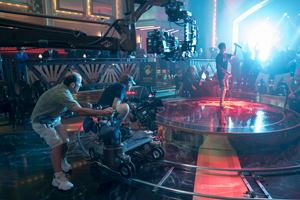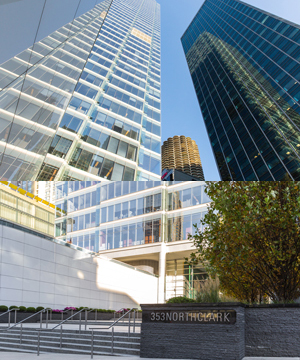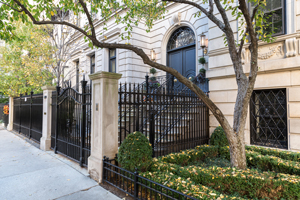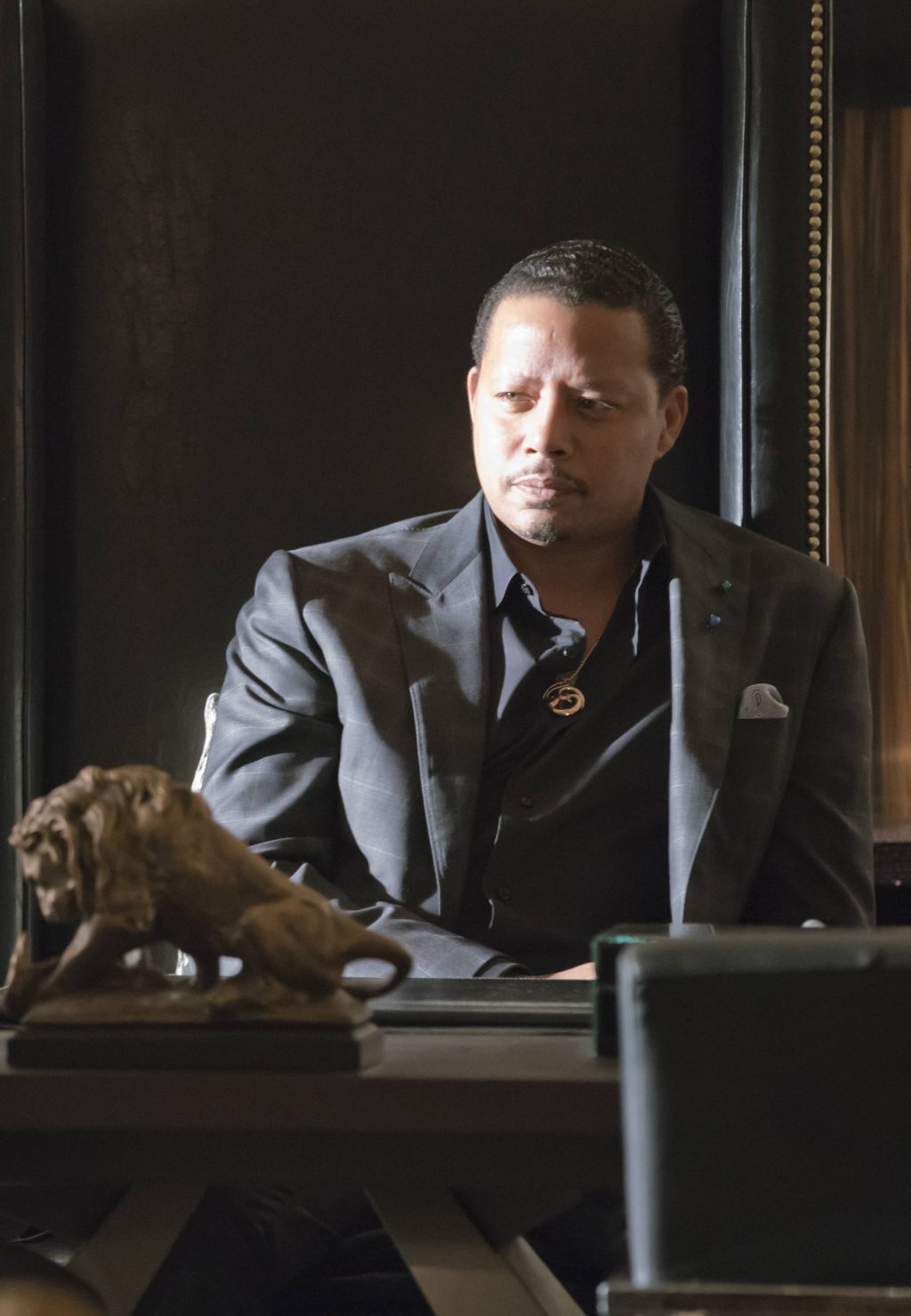
Building an Empire
Columbia alumni perform critical behind-the-scenes roles on Fox’s hit show.
By William Meiners MFA ’96
In Fox’s hit show Empire, hip-hop mogul Lucious Lyon (Terrence Howard) must choose which of his three sons will inherit his multimillion dollar entertainment company. On top of that, his ex-wife Cookie (Taraji P. Henson, who earned a Golden Globe for her role) is fresh from prison to demand her half of Empire Entertainment. Combining gritty storytelling with the backdrop of the hip-hop music business, the primetime show has soared beyond critical and rating success to a near-iconic status. But for all its popularity, part of the magic in the groundbreaking drama may come with the challenge of making Chicago look like New York City. Set in the Big Apple, but filmed in the Second City, Empire has shut down traffic and shot scenes all over downtown, as well as the south and west sides. Through three seasons now, it’s also employed plenty of people throughout the city, including several Columbia College Chicago alumni.
Ayanna Floyd MFA ’98, CeCe Destefano ’94, David Leonard ’97 and James “Jimmy” Carter ’09 give us a peek behind the scenes of the hit show.
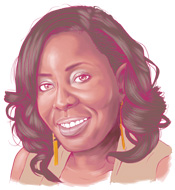 Ayanna Floyd MFA ’98 served as co-executive producer on the show’s second season. In that role, she helped develop ideas among the writers, wrote two episodes and traveled from Los Angeles to Chicago film sets to be on-site with the crew from sunup to sunset—available to address any challenges with the script.
Ayanna Floyd MFA ’98 served as co-executive producer on the show’s second season. In that role, she helped develop ideas among the writers, wrote two episodes and traveled from Los Angeles to Chicago film sets to be on-site with the crew from sunup to sunset—available to address any challenges with the script.
“Television is very much a writer’s medium,” Floyd says. “I wasn’t just interpreting words, but also in meetings from preproduction to location. Writers are a big part of the process, not like the movies where they can be disassociated from the production.”
The Toledo, Ohio, native came to Chicago with one-time aspirations of becoming “the black female Spike Lee” and found her writer’s voice at Columbia. “Actually, I learned what I didn’t want to do,” she says. “I didn’t like setting up cameras or lighting, and I hated the word F-stop.”
At Columbia, she quickly began shooting in Grant Park, getting into the editing cage and figuring out what kinds of jobs she liked. “You immediately had your hands on films and were telling stories,” she says. “I discovered I liked writing.”
An LA move, a Disney fellowship and a breakthrough writing job on the medical drama Gideon’s Crossing helped spur Floyd’s career in television. The chance to work with a predominantly African-American writing team on Empire, however, became an entirely new experience.
“In broadcast television, I’m often one of the only black people in the room,” Floyd says. “I had never worked anywhere where we were the majority [until Empire]. So the writing group felt very much like family.”
Floyd describes the writers’ room as a lively place where people pitch ideas and argue about what works. The showrunner has the last say, she says, but the writers are the first step in the process of making a television show come to life.
Even though Empire is a young television series, it continues to climb in viewership, critical acclaim and award nominations. The show’s largely African-American cast, including cameos and guest appearances from notable actors and hip-hop artists, may have helped foster its success. “We’ve never seen these characters on television,” Floyd says. “They’re just raw and don’t feel like TV archetypes. Overall, it just feels very fresh.”
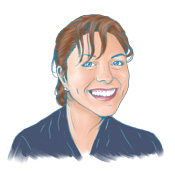 There are challenges when disguising Chicago as New York City for a television series—though nothing too daunting for CeCe Destefano ’94, the production designer who won an Emmy for her work on the pilot episode of Alias in 2001. As production designer, Destefano led the entire visual department in designing the first season of Empire, from costume to set design. While avoiding areas that showcase Chicago’s unique architecture, Destefano and her crew found areas that captured the density of New York and built appropriate sets.
There are challenges when disguising Chicago as New York City for a television series—though nothing too daunting for CeCe Destefano ’94, the production designer who won an Emmy for her work on the pilot episode of Alias in 2001. As production designer, Destefano led the entire visual department in designing the first season of Empire, from costume to set design. While avoiding areas that showcase Chicago’s unique architecture, Destefano and her crew found areas that captured the density of New York and built appropriate sets.
For the first season of Empire, Destefano worked closely with show creators Lee Daniels and Danny Strong to build an overarching look for the series. She then worked with writers and producing directors on each episode to ensure that the end product matched the vision.
“I had a great time designing the show. I felt like we pushed the envelope in helping create something different.”
Destefano says they shot in brownstones on Martin Luther King Jr. Drive that already had the look and feel of New York’s Harlem neighborhood. They also set up a concert at the Double Door in Wicker Park and hopped across Damen Avenue to the Blue Line Lounge, where they installed breakaway windows for a drive-by shooting scene.
“New York has so many looks,” Destefano says. “We looked for architecture that would work for the neighborhood they’re in.” And sometimes the timing was just right. “For episode two, we shot a portion of Lucious’ flashback music video on West Quincy Street because it worked for us visually,” Destefano says. “But it was also a street we could close to traffic in downtown after rush hour.”
 To set up city shoots, Destefano relied on the talents of people like Assistant Location Manager David Leonard ’97, who served as the liaison between the film production crew and the surrounding community. He was tasked with communicating with all of the property owners and managing the filming logistics, including how they might affect daily routines such as parking. Part of the process involved distributing leaflets two days prior to shoots to warn residents of potential disruptions to daily routines.
To set up city shoots, Destefano relied on the talents of people like Assistant Location Manager David Leonard ’97, who served as the liaison between the film production crew and the surrounding community. He was tasked with communicating with all of the property owners and managing the filming logistics, including how they might affect daily routines such as parking. Part of the process involved distributing leaflets two days prior to shoots to warn residents of potential disruptions to daily routines.
“I dealt with everything from irate neighbors who objected to shining bright lights on nighttime shoots to business owners upset over filming in front of their door,” says Leonard, who worked on the first two seasons of the show.
Leonard learned his way around City Hall, securing a plethora of permits required to park production vehicles and trailers, locating spaces for camera setups, and finding the police and fire officials needed for each location shoot.
Even the smallest of hiccups can disrupt a day’s shoot. Caught unaware of a planned concert in Daley Plaza or surprised by jackhammering from nearby construction sites, a production crew could be sent into a tailspin. On typical 16- to 18-hour days, Leonard’s approachable demeanor served him well in dealing with the public. He developed some of his personal negotiation skills as a student. “I was always networking and following up with people,” he says. “That’s certainly helped me a lot with what I’m doing now.”
“We’ve never seen these characters on television. They’re just raw and don’t feel like TV archetypes.” —Ayanna Floyd
Though she only worked on the first season of Empire, Destefano says she had a blast. “I had a great time designing the show,” she says. “I felt like we pushed the envelope in helping create something different because of the genre.”
 Empire opened the door for some crossover opportunities for James “Jimmy” Carter ’09, a working musician who “played” bass in the music label’s band on the show. Because Carter was hired through the Musicians’ Union, he wasn’t allowed to speak in any scenes. “If I had a line, that would be a different contract and I’d have to be part of the Actors’ Guild,” he says.
Empire opened the door for some crossover opportunities for James “Jimmy” Carter ’09, a working musician who “played” bass in the music label’s band on the show. Because Carter was hired through the Musicians’ Union, he wasn’t allowed to speak in any scenes. “If I had a line, that would be a different contract and I’d have to be part of the Actors’ Guild,” he says.
So how does a musician act? “Most of the time we’re pantomiming a performance, but it’s easy for us to look like we’re playing,” says Carter. “And we have played live on the set.”
One long day of pretending to play his bass may have even inspired his acting chops. In a scene on the show, Lucious works the band particularly hard. “We’re going to do it all night until we get it right,” he tells the gathered musicians.
The camera cuts to Carter’s natural look of anguish. His convincing performance led to a phone message from a friend who caught the episode: “Brother Jimmy, man you all over this show. It’s only been on five minutes and you have more face time than Lucious.”
With the large crews, extras and stand-ins, it seemingly takes a town to pull off the high-stakes production. In spite of the baggage that comes with city shoots, Empire has found a sweet home in Chicago. For the writers, producers and designers all working in tandem, the show’s success is linked to both this city and a well-oiled creative process. And for the Columbia alumni who’ve found their calling in television production, those lessons from their school days continuously come back into play.
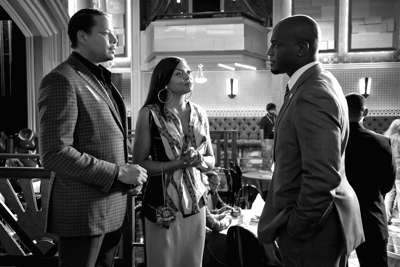
Terrence Howard, Taraji P. Henson and Taye Diggs stand as the three points of a love triangle on Empire.
Setting the Scene
Set in New York City but filmed largely in Chicago, Empire has to get creative with its filming locations. If you’re binging season one, keep your eyes peeled for some familiar architecture. Here, we spotlighted scenes shot in the city and the surrounding suburbs during the show’s first season.
S1, EP 1: “Pilot”
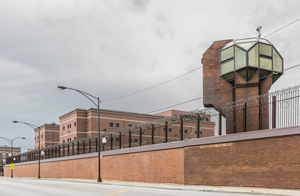
Cookie Lyon is released from prison, striding through the gate in a glamourous white fur coat. The scene was shot at the Cook County Department of Corrections at 2950 S. California Ave.
S1, EP 6: “Out Damned Spot”
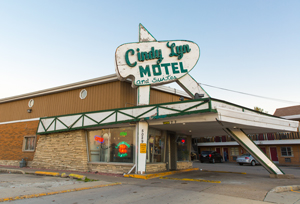
Cookie visits a friend in need at a seedy motel. The crew shot at the Cindy Lyn Motel at 5028 W. Ogden Ave. in Cicero, Illinois.
S1, EP 12: “Who Am I”
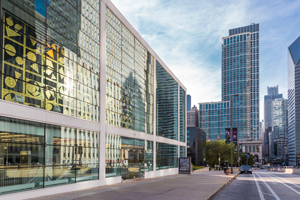
The building that houses the Lucious Lyon Sound tribute concert is filmed at 206 E. Randolph St. (and plastered with Lucious’ face for the occasion).
Chicago Stories
Craig Gore ’99, Tim Walsh ’97 and Paul Alan Cope ’11 bring the Chicago franchise to life.
Empire isn’t the only show with a Chicago base. Craig Gore ’99 and Tim Walsh ’97 have been writing partners for about 13 years, and now they share co-executive producer titles on Chicago P.D. The pair—who attended Columbia College Chicago at the same time but didn’t meet until later in Los Angeles—cut their collaborative teeth writing and selling television pilots. They are one of the original Chicago P.D. writing teams, having written since its debut on NBC in 2014.
Produced by Dick Wolf (creator and producer of the Law & Order franchise), the success of Chicago Fire was the greenlight for Chicago P.D. The Chicago franchise was further expanded with Chicago Med and Chicago Justice. The city itself provides a focus for the close-to-the-bone procedural tales.
The Windy City backdrop inspires the writers. “I finally bought my own Kevlar,” says Gore, who’s gone on many ride-alongs with Chicago cops to soak up the reality of their jobs.
Walsh is constantly revisiting the shadowy city of childhood. “I was born in Oak Park and raised in Palatine,” he says. “So the city was my backyard growing up. It’s an incredibly diverse landscape, which gives us an opportunity to explore characters and stories from vastly different backgrounds, socially and ethnically.”
From scripts focused on neighborhood gang violence to stories of high-end burglaries on the city’s North Side, Gore and Walsh have developed a draft, redraft and refine process that allows them to keep pace with a series that typically preps for eight days and shoots for eight days. Occasionally, they’ll pull an all-nighter to deliver a script under the looming deadline of a scheduled shoot.
While one leaves Los Angeles for Chicago shoots, the other reviews scripts from other writers and builds on writing developments. As for the show’s success, Gore says, “It seems to feed the need for a more grounded, straightforward cop show.”
Paul Alan Cope ’11 left Chicago for Columbia’s Semester in LA and now sits down the hall from Gore and Walsh. A script runner in his second season on Chicago Fire, Cope helps with everything from proofreading to continuity issues to securing the clearances required by a slew of network legal departments.
At 27 years old, Cope is content with his Los Angeles trajectory to date, which led him from behind-the-scenes work on reality television to his current gig with a scripted show. “My ultimate goal is to be a filmmaker,” he says. “Screenwriting looked a little more obtainable, so it made sense to try and get into that room.”
As part-time faculty in the Semester in LA program, Gore helps others get into similar rooms. With an April to June break from Chicago P.D., he teaches a class where students complete an original television pilot script. In addition to writing and revising scripts based on feedback, students also hear their scripts read by actors in a table read, and Gore brings in agents, managers, producers and executives as guest speakers.
